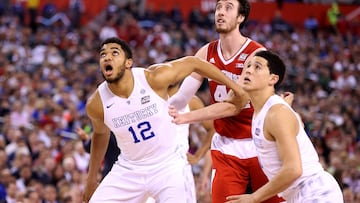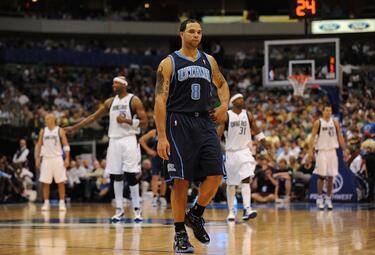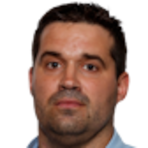Towns, Booker, Cousins, Wall… when NBA talent fell short in March Madness
Throughout NCAA history, some of the most star-studded rosters—teams stacked with future NBA talent—have ended their college seasons in stunning disappointment.

That’s the chaos of March Madness. A team can roll into the Final Four at 38-0 and still leave without a title. That lone “1″ in a 38-1 record becomes the difference between immortality and a forgotten run. It’s why the tournament delivers such passion, upsets, comebacks, busted brackets, and frantic betting. It’s March—and anything can happen.
And sometimes, it happens to the biggest names, even when the bench is led by a coaching legend like John Calipari. Even when the team features two players who’d go on to be selected 1st and 13th in the following NBA Draft—players who have since racked up nine All-Star appearances and over $350 million in NBA contracts.
That was the story of the 2014–15 Kentucky Wildcats—Karl-Anthony Towns. Devin Booker. A decade later, their undefeated run still ends in one of college basketball’s greatest “what ifs.”
Nine players from that Wildcats squad eventually made it to the NBA, including Trey Lyles (No. 12 pick in 2015), Willie Cauley-Stein (No. 6), and twins Aaron and Andrew Harrison. Dakari Johnson and Alex Poythress also got NBA minutes. Four of the first 13 picks in the 2015 draft came from this one roster. Yet despite a 38-0 start and more than 72,000 fans packed into Lucas Oil Stadium for the Final Four, Kentucky never made the title game. They fell 71–64 to Wisconsin, a veteran squad led by Frank Kaminsky, Sam Dekker, and Nigel Hayes-Davis.
The dream of a perfect 40-0 season ended in heartbreak—an all-time great team, loaded with future pros, remembered as one of the NCAA’s biggest disappointments.
And Kentucky knows that pain well.
The 2009–10 Wildcats had five first-round picks, including No. 1 overall pick John Wall, No. 5 DeMarcus Cousins, and No. 18 Eric Bledsoe. But their run ended even earlier—in the Elite Eight—falling to West Virginia in a game where they shot an abysmal 4-of-32 from beyond the arc. That team finished 35–3.
Go further back to 1965–66, and you’ll find another Kentucky team with big names—Pat Riley and Louie Dampier—that fell short. That squad finished 27–2 but lost in the national championship game to Texas Western (now UTEP), a team that made history by starting five Black players against Kentucky’s all-white lineup coached by Adolph Rupp. That title game, later immortalized in the film Glory Road, was a turning point in racial integration in American sports. Riley, years later, said Texas Western “signed the Emancipation Proclamation of 1966″ that night.
Derrick Rose, Wiggins and Embiid...
The list goes well beyond Kentucky, of course, if you look at college teams packed with future NBA stars that still fell short of winning it all. There were three notable examples between 2005 and 2008. First, the Illinois Fighting Illini of 2005, who started the season 29–0 and finished 37–2 after losing in the national championship game to a North Carolina team led by Raymond Felton, Marvin Williams, and Rashad McCants. The stars of that Illinois team were Deron Williams and Dee Brown. Three other players—Luther Head, Roger Powell, and James Augustine—also made it to the NBA.

In 2007, the Ohio State Buckeyes—better known for their football success—were chasing just the second basketball title in school history. They had Mike Conley, the No. 4 pick in the draft, and Greg Oden, who went No. 1 overall ahead of Kevin Durant. The roster also included Daequan Cook and Othello Hunter, but in the final they couldn’t get past a Florida Gators team that also boasted significant NBA talent: Al Horford and Joakim Noah formed a wall in the paint.
A year later, John Calipari was still at Memphis (he would move to Kentucky in 2009), and the star of his Tigers team was Derrick Rose, who would go on to become the No. 1 pick in the draft and, in 2011, the youngest MVP in NBA history. That starting five also included other future NBA players: Chris Douglas-Roberts, Joey Dorsey, and Antonio Anderson. The team finished 38–2 but lost the national title game to the Kansas Jayhawks in overtime, after a legendary game-tying three from Mario Chalmers—who would later win an NBA title with LeBron James and Dwyane Wade’s Miami Heat. Memphis had reached the final by beating a UCLA team that featured Kevin Love, Russell Westbrook, and Luc Mbah a Moute in the semifinals.
Kansas won the title that season, but had a high-profile flop in 2013–14, when they brought together Andrew Wiggins and Joel Embiid, the No. 1 and No. 3 picks in the next draft. They didn’t make it past the second round, falling to Stanford. Embiid had played 28 games that season but missed both the Big 12 Tournament and March Madness due to a back injury.
Another strong Kansas team was the 1996–97 version, which featured Paul Pierce and Raef LaFrentz and was coached by the unforgettable Roy Williams. That team also fell short, losing in overtime to the Arizona Wildcats in the Final Four—despite a huge performance from Pierce (27 points, 11 rebounds) for a team that had gone 34–2. In addition to Pierce and LaFrentz, four other players from that squad made it to the NBA: Scott Pollard, Billy Thomas, Jacque Vaughn, and Ryan Robertson.
Other notable March Madness cases
Other notable cases include the Indiana Hoosiers of the 1974–75 season, who finished 31–1 under head coach Bobby Knight and had eight future NBA players on the roster. Despite that, they fell in the semifinals to Kentucky.
Then there were the 1982–83 Houston Cougars, the legendary Phi Slama Jama team featuring Hakeem Olajuwon and Clyde Drexler. They were heavy favorites to win the title but collapsed in the Final Four, blowing a 20-point second-half lead against North Carolina State. The Wolfpack came back to win 54–52. And it wasn’t just Olajuwon and Drexler—those Cougars also had NBA players Michael Young and Larry Micheaux.
In 1984–85, the Georgetown Hoyas were led by Patrick Ewing and coached by the unforgettable John Thompson. They went 35–3 that season but lost in the national championship game to the Villanova Wildcats. That 66–64 loss remains one of the biggest upsets in tournament history. Surrounding the dominant Ewing were four players who would go on to the NBA: Reggie Williams, Bill Martin, David Wingate, and Michael Jackson.
The 1990–91 UNLV Runnin’ Rebels were one of the most celebrated college teams of all time. They finished the season 34–1, with Jerry Tarkanian on the bench and three standout stars: Larry Johnson, Stacey Augmon, and Greg Anthony. Their up-tempo, high-flying style captivated fans across the country—but they fell short in the Final Four, losing to a Duke team that would go on to win the title.
The Michigan Wolverines of 1992–93 were another unforgettable team that didn’t win it all: the Fab Five. In their freshman season, they reached the title game but were blown out 71–51 by a dominant Duke team led by Christian Laettner, Grant Hill, and Bobby Hurley. A year later, in 1993, they returned to the final but lost again—this time in heartbreaking fashion to North Carolina, 77–71. That game is remembered for Chris Webber calling a timeout when his team had none left. Webber, the No. 1 pick in the 1993 draft, was joined in the Fab Five by Jalen Rose, Juwan Howard, Jimmy King, and Ray Jackson. Also on the roster was Rob Pelinka—now the high-profile general manager of the Lakers and formerly Kobe Bryant’s agent.
Lastly, the 1994–95 North Carolina Tar Heels came up short in the semifinals, losing to Arkansas. That team would produce the No. 3 and No. 4 picks in the next NBA Draft—Jerry Stackhouse and Rasheed Wallace—as well as three second-round selections in the years that followed: Shammond Williams, Jeff McInnis, and Serge Zwikker.
Get your game on! Whether you’re into NFL touchdowns, NBA buzzer-beaters, world-class soccer goals, or MLB home runs, our app has it all. Dive into live coverage, expert insights, breaking news, exclusive videos, and more – plus, stay updated on the latest in current affairs and entertainment.
Download now for all-access coverage, right at your fingertips – anytime, anywhere.

Complete your personal details to comment
Your opinion will be published with first and last names